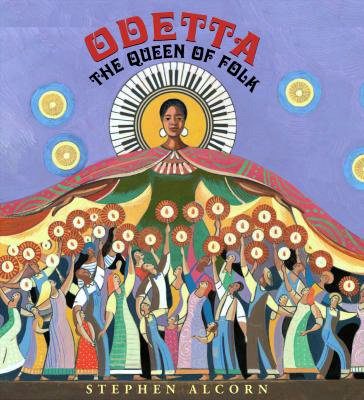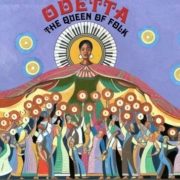ODETTA, THE QUEEN OF FOLK
TITLE: ODETTA, THE QUEEN OF FOLK
AUTHORS: STEPHEN ALCORN
(Conceived and Illustrated by)
POEM BY SAMANTHA THORNHILL
PUBLISHER: SCHOLASTIC PRESS
RELEASE DATE: 2010
 Told in the form of a long poem, this is the life of Odetta, and especially her childhood, which greatly shaped her music. It is aimed at children, although adults can easily appreciate the beauty of the work and the life it describes. Artist Stephen Alcorn, who had previously worked on books about Langston Hughes and other African American poetry and poets, has included pieces portraying Odetta in various ways, ranging from the mischievous to the angelic.
Told in the form of a long poem, this is the life of Odetta, and especially her childhood, which greatly shaped her music. It is aimed at children, although adults can easily appreciate the beauty of the work and the life it describes. Artist Stephen Alcorn, who had previously worked on books about Langston Hughes and other African American poetry and poets, has included pieces portraying Odetta in various ways, ranging from the mischievous to the angelic.
So, who was Odetta, and why should kids care? Odetta Holmes learned about some of the “facts” of American life while a child in Birmingham, Alabama in the 1930s. Jim Crow laws controlled who could drink from what water fountain, or what train car you could ride. By the time her family moved to California, her family had faced the shame and degradation that was an everyday part of being “colored” in the South. In California, she noticed a remarkable thing. Discrimination still existed, but it was not the same, and not part of the law. Life in California allowed her to live, and to dream. She took that little extra freedom, and turned to music. Odetta’s mother hoped that she would turn to opera, to become the next Marian Anderson. Instead, she turned to musical theater, working alongside Elsa Lanchester and by the age of 19 she was touring with Finian’s Rainbow. Then, she turned to folk music.
By the 1950s, Odetta was playing older songs in clubs, and cut her first album with Larry Mohr in 1954, Odetta and Larry. It contained traditional songs, but also songs by Leadbelly, Blind Blake and other more recent songs, including The Frozen Logger. She continued performing, recording and acting until months before her death in 2008, singing from a wheelchair on her last tour.
Odetta played everywhere, from Civil Rights marches to Carnegie Hall, and her voice and distinctive guitar style influenced many musicians, from Bob Dylan to Joan Armatrading. Dr. Martin Luther King, Jr., was the one who called her “The Queen of Folk Music,” at a time when she and other artists, including Harry Belafonte, were breaking down the color barriers that pervaded music in concert halls and on the radio. She sang old songs, but she also took the songs of 20th century songwriters and shared them with audiences around the world. She sang songs that were not limited by ethnic boundaries. Her versions of Bob Dylan or Leadbelly songs were as powerful as her versions of older blues and spirituals. Bob Dylan credits Odetta with luring him away from the electric guitar to the acoustic one, for folk tunes. Otherwise, he would always have been an electric guitarist, to the dismay of folkies everywhere.
Odetta, the Queen of Folk, is not a “facts and figures” biography for school reports. Instead, it is a loving, artistic and poetic tribute to a woman who was a great musician. The kids, and adults, who will be attracted to this book are exactly the ones that Odetta would have wanted to reach, to inspire them and to keep the old songs alive and the new ones coming.
Nick Smith is coordinator of the Caltech Folk Music Society and on the board of directors of the California Traditional Music Society, as well as being a performing storyteller.













